Current Research Fellows
Physics
Dr. Michael Endres
Quantum Hadron Physics Laboratory, RNC
I have been an FPR fellow at RIKEN for approximately one and a half years, formerly as a member of the Theoretical Physics Laboratory (now defunct), and now as a member of the Quantum Hadron Physics Laboratory. My current research interests focus on the development and use of lattice field theory techniques to study strongly interacting systems nonperturbatively. These range from supersymmetric gauge theories, which may be relevant for beyond the Standard Model physics, to theories describing the few- and many-body properties of strongly interacting nonrelativistic fermions, the "unitary Fermi gas" in particular. The latter are not only relevant for ultra-cold atom experiments, but also provides an idealized description of nuclear matter.
My work often relies heavily on the use of powerful supercomputers or smaller clusters in order to perform numerical simulations of physically interesting systems such as those mentioned above. I have found that RIKEN provides ample resources and support for achieving my research objectives, including on-site computing resources which are readily available for use and easily accessible by researchers, and a substantial yearly grant allocation which may be used for research related materials, business travel and hosting visitors as well as collaborators. One aspect of working at RIKEN that I find particularly enjoyable is the complete freedom and flexibility afforded me to pursue my research interests as they develop and evolve over time. RIKEN provides a particularly unique and stimulating research environment in part because of the heavy flow of visitors from institutions both domestic and overseas, offering broad exposure to experts from many different fields of science world-wide.
As a foreigner, navigating the intricacies of the Japanese system in daily life can sometimes be difficult. Fortunately, RIKEN provides full-time support staff to assist foreigners with problems as they arise, not only within but also outside the work place (e.g., assisting with housing accommodations, setting up bank accounts, etc.). Living abroad provides a rare opportunity for exploring a new culture, learning a new language, as well as achieving a broadened perspective of the world. I have found living and working in Japan to be a challenging, but ultimately rewarding experience, offering plenty of opportunities for both personal growth and professional development. Joining RIKEN is a decision that I will never regret.
Chemistry
Dr. Huan Shen
Molecular Reaction Dynamics Research Team, ASI
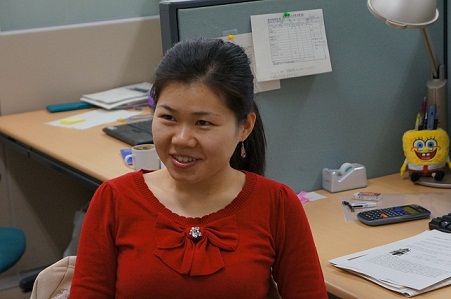
I joined in the Advanced Science Institute of RIKEN as an FPR in March 2012, and worked in the molecular reaction dynamics team led by Prof. T. Suzuki. The main reason I chose RIKEN is because with the FPR program you can work on the research topic that you propose. Besides, RIKEN is one of the top-level research institutes in the basic science area. It attracts worldwide researchers by its international research environment and excellent equipment.
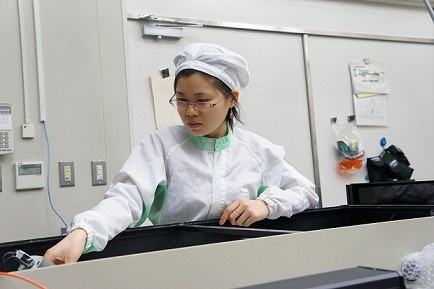
My research background is physical chemistry and I major in ultrafast dynamics studies. After I got my PhD, I became a postdoctoral fellow in Kyoto University. At that time, I focused on time-resolved photoelectron spectroscopy of liquid beams. Due to the specific requirements and challenging aspects of this type of research, only a few groups in the world are able to perform the research. However, RIKEN is truly a great institute with nice research budget, which can support very challenging research projects. With the FPR program, therefore, I can expand on my previous work. We will construct a new apparatus which can detect photoelectron spectra for both of liquid beams and gas-phase molecular beams, and also, we will extend the femtosecond laser source from the DUV to the VUV region. These improvements allow us to study the ultrafast dynamics of dry DNA as well as DNA solutions. With our efforts, more interesting and comprehensive information about the ultrafast dynamics of DNA is expected.
Our group members are very kind and brilliant, and I'm so glad that I can work with them. As a young researcher, such an active research environment is really inspiring my pursuit of science. And also, RIKEN provides many convenient services to foreigners, such as on-campus housing in I-House, which makes life in RIKEN much easier.
Biology/Medical Science
Dr. Gianluca Esposito
Kuroda Research Unit, BSI
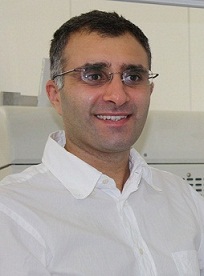
I have been privileged since May 2011 to work in Dr. Kumi Kuroda's Lab (Unit for Affiliative Social Behavior) at the RIKEN Brain Science Institute under the FPR program. I decided to apply for an FPR fellowship after having worked in the same lab back in 2010 supported by the Japan Society for the Promotion of Science.
After the March 11 earthquake and the consequent Fukushima nuclear plant accident, my wife and I were worried about relocating to Japan. Both the head of my lab and the FPR program staff were very helpful in providing us with all the support and information we needed. They also allowed us to postpone my arrival. Now, after having settled down and begun my research activity here, I am truly elated that I took this singular opportunity. I am interacting with scientists from all over the world and I am immersed in a rich and dynamic environment where I can focus on my research projects.
My background is in developmental neuropathology and I completed my PhD defending a thesis on "Early Biomarkers of Autism Spectrum Disorders," at the University of Trento in Italy. Currently, I am studying the behavioral, physiological, and neural mechanisms that regulate mother-infant interaction in rodents and humans and their implications in developmental disorders.
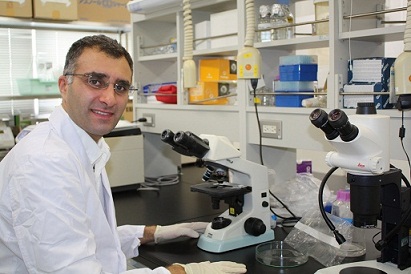
From an evolutionary point of view, mother-infant interaction is essential for the survival of mammalian infants. Therefore both mothers and infants are equipped with mechanisms that favor mother-infant interaction and are paramount for the development of mammalian infants. Investigating these mechanisms is of great interest for two main reasons: (i) these mechanisms are conserved across mammalian evolution and (ii) their assessment can provide useful insights on early stages of developmental disorders (e.g. Autism Spectrum Disorders).
Coming from a background of human infant research, I am expanding my skills here in my lab. I am learning, for example, how to use pharmacological stimulations and genetic engineering in rodent studies. I am also gaining knowledge on how to design experimental procedures for comparative analysis in humans and other mammalian species.
In my free time, I am studying Japanese (taking classes provided by RIKEN), playing futsal (indoor soccer, very popular in Japan) and travelling around Japan (either by train or motorbike). I can now prepare sushi by myself, but to really master that... I still need much more time to practice.
Engineering
Dr. Feng Qi
Tera-photonics Team, ASI
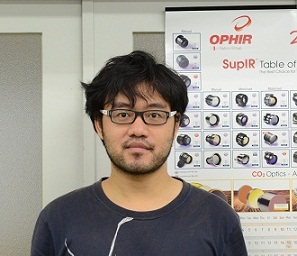
I joined RIKEN three months ago, in June 2011. Due to the huge earthquake on March 11, my trip to Japan was delayed for two months. Although there were some troubles about the trip, I finally made it to Sendai. Now I am working in the Tera-Photonics Team, supervised by Dr. Hiroaki Minamide.
In this lab, the research is quite colorful and the scope extends to far more than I had originally expected, ranging from key technology of THz emission and detection and nonlinear optical crystal growth, to biological studies. In my opinion, the fundamental research is well implemented. Moreover, research on applications is also encouraged, making the work quite meaningful and fascinating. Unlike most labs in the world, which focus on THz TDS techniques, we work on monochromatic THz waves. Essentially, we try to extend the electromagnetic spectrum to far-infrared or even millimeter-wave region. By making use of nonlinear optics theory, we are trying to fill the famous `THz Gap` to achieve valuable applications of THz systems. Now, I am mainly working on the THz detection part, which is essential for any system. Though there are some THz detectors at the moment, many suffer from slow-response, poor sensitivity, and inconvenience of use. I hope to solve some of these problems by developing ultra-fast THz detection that works at room temperature and is relatively low cost. If I succeed, this will further both imaging and spectroscopy applications. Although I have just started my work, based on the expertise of the team and very good facilities, I am quite confident that I can contribute something nice to THz detection.
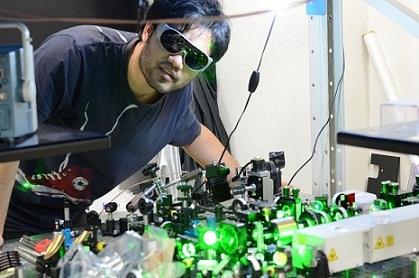
Before joining RIKEN, I completed my PhD at Katholieke Universiteit Leuven, Belgium. Over the past five years I worked in a joint project on "Contraband detection by active millimeter wave (mmW) imaging systems". At that time, my focus was on system-level studies of the imaging process and mmW detection. However, compared to mature optical imaging with its history of thousands of years, mmW imaging is just a baby. Consequently, in my studies I frequently consulted optics science and I frequently went back and forth between microwave and optics. In my mid-term PhD defense, I concluded, "Definitely, the success from optics is a good starting point and it will serve the research in mmW/THz wave studies, but a simple copy is not good enough, we should pay attention to both the theoretical and practical differences. The task of bridging optics and microwave technology may be my life-long work". So after working on microwave for six years, I have now transferred completely to pure optics. Regarding wave-particle duality, I can continue with my previous inquiry from the perspective of particles. A parallel study of these two areas makes me quite excited.
Nowadays, it is quite difficult to find good research opportunities, especially because of the bad economic environment. Thanks to the FPR program offered by RIKEN, which supplies both stable funding and an excellent research environment, I can get strong support both financially and technically to focus on my scientific interests. I realize that in most labs, a major technical change is not welcome, since people generally prefer to hire someone who has a quite similar background. So I am especially grateful to RIKEN, which allows me to think and work freely to achieve excellent science. Personally, I respect RIKEN`s global perspective. The FPR program opens a door to all young researchers around the world.
Regarding my life in Japan, thanks to my nice colleagues, I have not had any big trouble so far. In Japan, daily life is very convenient. All the shops are open even on Sundays and there are a lot of 24-hour shops. So I do not worry about meals. Actually, I seldom cook for myself since coming here. On weekends, I play basketball with my friends and enjoy parties. To sum up, in Japan, everyone works hard and plays hard!

